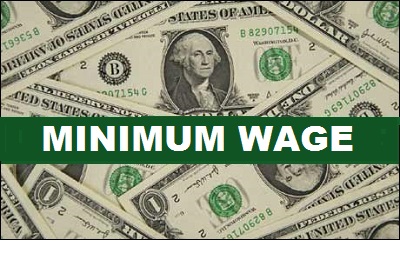
|
|

|
|
| April 25, 2024 |
|
14 states boost minimum wage to start new year 
Fourteen states, including New York and California lifted their minimum wages on either New Year’s Eve or New Year’s Day.
These wage increases range from a 35 cents an hour in states like Michigan to a dollar in California, Massachusetts and Nebraska, CNBC reported. The hikes will come as most American workers continue to suffer from broad-based pay stagnation, even as the official unemployment rate falls, the International Business Times explained. The pay raises also underline the growing gap between statewide wage floors and the federal hourly minimum, which remains $7.25. Twenty-nine states and the District of Columbia, have minimum wages higher than the federal pay floor, according to the National Conference of State Legislatures. In addition to the wave of New Year’s pay hikes, Nevada, Minnesota and Maryland are slated to hike their minimum wages later in 2016. A number of cities are poised to follow suit during the year, including Seattle, San Francisco and Los Angeles, which are all phasing in $15 minimum hourly wages. Those three cities' wage hikes, the most ambitious and controversial of the bunch, are largely the product of the so-called Fight for 15, a union-backed protest movement, IBT reported. Christine Owens, executive director of the National Employment Law Project, a research and advocacy group, applauded the series of pay increases. But she said the hikes are unlikely to dramatically affect most workers’ paychecks. “The increases in 2016, particularly those that aim for $15 within a reasonable period, are a good start but they will not immediately halt broad-based wage stagnation,” Owens told IBT. “That’s because wages have been stagnant or fallen across the board for most workers, particularly for workers whose wages are lowest, for many years, and it will take a while for these patterns to reverse.” But some fear the ripple effects of higher pay. “Any discussion about raising the minimum wage needs to recognize that small employers often have to operate under very slim profit margins and will have the hardest time absorbing these higher labor costs,” said Randy Johnson, senior vice president at the Chamber of Commerce. “They will have to find more revenues or trim costs to make up the difference.” According to the Bureau of Labor Statistics, roughly 3 million workers earned the federal minimum wage or less last year. The federal minimum for employees who receive tips is $2.13 an hour. That’s not to say that all minimum-wage workers will see more green in 2016, Fortune reported. “Some states automatically adjust their bottom pay rates to reflect changes in the cost of living, so low inflation has translated to minuscule increases. In eight states that index their minimum wages to consumer prices, Arizona, Florida, Missouri, Montana, Ohio, New Jersey, Oregon, and Washington, workers won’t be getting any legally mandated raise at all,” Fortune reported. Meanwhile, increasing the minimum wage is an inefficient way to reduce poverty, according to a Fed research paper that comes amid a national clamor to hike pay for workers at the low end of the salary scale, CNBC reported. David Neumark, visiting scholar at the San Francisco Fed, contends that raising the minimum wage has only limited benefits in the war against poverty, due in part because relatively few of those falling below the poverty line actually receive the wage. Many of the benefits from raising the wage, a move already undertaken by multiple governments around the country as well as some big-name companies, tend to go to higher-income families, said Neumark, who also pointed to research that shows raising wages kills jobs through higher costs to employers. Neumark is a professor of economics and director of the Center for Economics and Public Policy at the University of California, Irvine. "Setting a higher minimum wage seems like a natural way to help lift families out of poverty. However, minimum wages target individual workers with low wages, rather than families with low incomes," he wrote. "Other policies that directly address low family income, such as the earned income tax credit, are more effective at reducing poverty." Here are the states planning to increase minimum wages in 2016: • Alaska, from $8.75 to $9.75 • Arkansas, $7.50 to $8.00 • California, $9.00 to $10.00 • Colorado, $8.23 to $8.31 • Connecticut, $9.15 to $9.60 • Hawaii, $7.75 to $8.50 • Massachusetts, $9.00 to $10.00 • Michigan, $8.15 to $8.50 • Nebraska, $8.00 to $9.00 • New York, $8.75 to $9.00 (as of 12/31/15, fast food excepted) • Rhode Island, $9.00 to $9.60 • South Dakota, $8.50 to $8.55 • Vermont, $9.15 to $9.60 • West Virginia, $8.00 to $8.75 (as of 12/31/15) (Source: NewsMax) Story Date: January 4, 2016
|